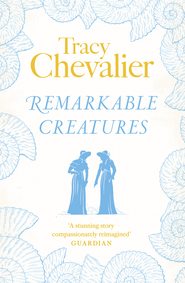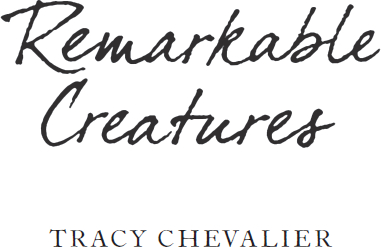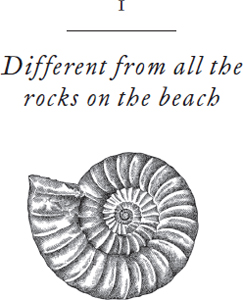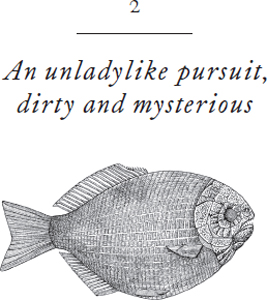
Полная версия:
Remarkable Creatures



Copyright
This novel is entirely a work of fiction. The names, characters and incidents portrayed in it are the work of the author’s imagination. Any resemblance to actual persons, living or dead, events or localities is entirely coincidental.
The Borough Press
An imprint of HarperCollinsPublishers Ltd.
1 London Bridge Street
London SE1 9GF
www.harpercollins.co.uk
First published by HarperCollinsPublishers 2009
Copyright © Tracy Chevalier 2009
Chapter head motifs © Neil Gower
Cover layout design © HarperCollinsPublishers Ltd 2014. Cover illustrations © Neil Gower
Tracy Chevalier asserts the moral right to be identified as the author of this work
A catalogue record for this book is available from the British Library
All rights reserved under International and Pan-American Copyright Conventions. By payment of the required fees, you have been granted the non-exclusive, non-transferable right to access and read the text of this ebook on screen. No part of this text may be reproduced, transmitted, down-loaded, decompiled, reverse engineered, or stored in or introduced into any information storage and retrieval system, in any form or by any means, whether electronic or mechanical, now known or hereinafter invented, without the express written permission of HarperCollins ebooks
HarperCollinsPublishers has made every reasonable effort to ensure that any picture content and written content in this ebook has been included or removed in accordance with the contractual and technological constraints in operation at the time of publication
Source ISBN: 9780007178384
Ebook Edition © AUGUST 2014 ISBN: 9780007341108
Version: 2016-11-21
Dedication
This is for my son, Jacob
Table of Contents
Cover
Title Page
Copyright
Dedication
1. Different from all the rocks on the beach
2. An unladylike pursuit, dirty and mysterious
3. Like looking for a four-leaf clover
4. That is an abomination
5. We will become fossils, trapped upon beach forever
6. A little in love with him myself
7. Like the tide making its highest mark on the beach and then retreating
8. An adventure in an unadventurous life
9. The lightning that signalled my greatest happiness
10. Silent together
Postscript: The reader’s patience
Keep Reading
Further Reading
About the Author
Also by Tracy Chevalier
About the Publisher

Lightning has struck me all my life. Just once was it real. I shouldn’t remember it, for I was little more than a baby. But I do remember. I was in a field, where there were horses and riders performing tricks. Then a storm blew in, and a woman – not Mam – picked me up and brought me under a tree. As she held me tight I looked up and saw the pattern of black leaves against a white sky.
Then there was a noise, like all the trees falling down round me, and a bright, bright light, which was like looking at the sun. A buzz run right through me. It was as if I’d touched a hot coal, and I could smell singed flesh and sense there was pain, yet it weren’t painful. I felt like a stocking turned inside out.
Others begun pulling at me and calling, but I couldn’t make a sound. I was carried somewhere, then there was warmth all round, not a blanket, but wet. It was water and I knew water – our house was close to the sea, I could see it from our windows. Then I opened my eyes, and it feels like they haven’t been shut since.
The lightning killed the woman holding me, and two girls standing next to her, but I survived. They say I was a quiet, sickly child before the storm, but after it I grew up lively and alert. I cannot say if they’re right, but the memory of that lightning still runs through me like a shiver. It marks powerful moments of my life: seeing the first crocodile skull Joe found, and finding its body myself; discovering my other monsters on the beach; meeting Colonel Birch. Other times I’ll feel the lightning strike and wonder why it’s come. Sometimes I don’t understand, but accept what the lightning tells me, for the lightning is me. It entered me when I was a baby and never left.
I feel an echo of the lightning each time I find a fossil, a little jolt that says, “Yes, Mary Anning, you are different from all the rocks on the beach.” That is why I am a hunter: to feel that bolt of lightning, and that difference, every day.

Mary Anning leads with her eyes. That was clear even the first time we met, when she was but a girl. Her eyes are button brown, and bright, and she has a fossil hunter’s tendency always to be looking for something, even when on the street or in a house where there is no possibility of finding anything of interest. It makes her appear vigorous, even when she is still. I have been told by my sisters that I too glance about rather than hold a steady gaze, yet they do not mean it as a compliment as I do with Mary.
I have long noted that people tend to lead with one particular feature, a part of the face or body. My brother, John, for instance, leads with his eyebrows. It is not just that they form prominent tufts above his eyes, but they are the part of his face that moves the most, tracing the course of his thoughts as his brow furrows and clears. He is the second eldest of the five Philpot siblings, and the only son, which made him responsible for four sisters after our parents’ death. Such circumstances will move anyone’s eyebrows, though even as a boy he was serious.
My youngest sister, Margaret, leads with her hands. Though small, their fingers are proportionately long and elegant, and she plays the piano better than the rest of us. She is given to waving her hands about as she dances, and when she sleeps she throws her arms above her head, even when the room is cold.
Frances has been the only Philpot sister to marry, and leads with her bosom – which I suppose explains that. We Philpots are not known for our beauty. Our frames are bony, our features strong. Moreover, there was really only family money enough for one sister to marry with ease, and Frances won the race, leaving Red Lion Square to become the wife of an Essex merchant.
I have always admired most those who lead with their eyes, like Mary Anning, for they seem more aware of the world and its workings. That is why I get on best with my eldest sister, Louise. She has grey eyes, like all the Philpots, and says little, but when her eyes fix on you, you take notice.
I have always wanted to lead with my eyes as well, but I have not been so fortunate. I have a prominent jaw, and when I grit my teeth – more often than I ought, for the world frustrates me – it tenses and sharpens like an axe blade. At a ball once I overheard a potential suitor say he did not dare ask me to dance for fear of cutting himself on my face. I have never really recovered from that remark. It explains why I am a spinster, and why I dance so seldom.
I have longed to move from jaw to eye, but I have noticed that people do not change which feature they lead with, any more than they change in character. And so I am stuck with my strong jaw that puts people off, set in stone like the fossils I collect. Or so I have thought.
I met Mary Anning in Lyme Regis, where she has lived all her life. It was certainly not where I expected to live. London was, of course, specifically Red Lion Square, where we Philpots grew up. Though I had heard of Lyme, as one does of seaside resorts when they become fashionable, we had never visited. We usually went to Sussex towns such as Brighton or Hastings during the summer. When she was alive our mother was keen for us to breathe the fresh air and bathe in the sea, for she subscribed to the views of Doctor Richard Russell, who had written a dissertation about the benefit of sea water, to bathe in and to drink as well. I refused to drink sea water, but I did swim sometimes. I was at home by the sea, though I never thought that would become a literal truth.
Two years after our parents’ death, however, my brother announced at dinner one evening his engagement to the daughter of one of our late father’s solicitor friends. We kissed and congratulated John, and Margaret played a celebratory waltz on the piano. But in bed that night I wept, as I suspected my sisters did as well, for our London lives as we knew them were over. Once our brother married there would be neither the place nor the money for us all to live at Red Lion Square. The new Mrs Philpot would of course want to be mistress of her own home, and fill the house with children. Three sisters was a surfeit, especially when we were unlikely to marry. For Louise and I both knew we were destined to remain spinsters. Because we had little money, our looks and characters were meant to attract husbands, yet ours were too irregular to help us. Though her eyes lifted and brightened her face, Louise was very tall – far taller than most men could manage – and had large hands and feet. Moreover, she was so quiet that suitors were unnerved by her, thinking she was judging them. She probably was. As for me, I was small and bony and plain, and I could not flirt, but would try to talk about serious things, and that drove the men away too.
We were to be moved on, then, like sheep shifted from one cropped field to another. And John must be our shepherd.
The next morning he laid on the breakfast table a book he had borrowed from a friend. “I thought for your summer holiday you might like to go somewhere new rather than visit our aunt and uncle in Brighton again,” he suggested. “A little tour, if you like, along the south coast. With the war with France cutting off travel to the Continent, so many more coastal resorts are springing up. There may be places you will like even more than Brighton. Eastbourne, perhaps, or Worthing. Or further afield, to Lymington, or the Dorset coast: Weymouth or Lyme Regis.” John was reciting these places as if going down a list in his head, placing a little tick beside each one as he named it. That was how his tidy solicitor’s mind worked. He had clearly thought through where he wanted us to go, though he would herd us there gently. “Have a look to see what you fancy.” John tapped the book. Although he said nothing, we all knew we were looking not simply for a holiday destination, but for a new home, where we could live in gently diminished circumstances rather than as London paupers.
When he had gone out to his chambers, I picked up the book. “A Guide to All the Watering and Sea-Bathing Places for 1804,” I read out, for Louise and Margaret’s benefit. Flipping through it, I found entries on English towns in alphabetical order. Fashionable Bath had the longest entry, of course – forty-nine pages, along with a large map and a pull-out panoramic view of the city, with its even, elegant facades cupped by surrounding hills. Our beloved Brighton had twenty-three pages and a glowing report. I looked up the towns our brother had mentioned, some of which were little more than glorified fishing villages, warranting only two pages of indifferent platitudes. John had made a dot in the margin of each. I expect he had read every entry in the book and chosen those that suited best. He had done his research.
“What’s wrong with Brighton?” Margaret demanded.
I was reading about Lyme Regis then, and grimaced. “Here is your answer.” I handed her the guide. “Look at what John has marked.”
“‘Lyme is frequented principally by persons in the middle class of life’,” Margaret read aloud, “‘who go there, not always in search of their lost health, but as frequently perhaps to heal their wounded fortunes, or to replenish their exhausted revenues’.” She let the book drop in her lap. “Brighton is too expensive for the Philpot sisters, then, is it?”
“You could stay here with John and his wife,” I suggested in a burst of generosity. “They could manage one of us, I expect. We may as well not all be banished to the coast.”
“Nonsense, Elizabeth, we shan’t be separated,” Margaret declared with a loyalty that made me hug her.
That summer we toured the coast as John had suggested, accompanied by our aunt and uncle, our future sister-in-law and her mother, and John when he could manage it. Our companions made comments like “What glorious gardens! I envy those who live here all year round and can walk in them any time they like,” or “This circulating library is so well stocked you would think you were in London,” or “Isn’t the air here so soft and fresh? I wish I could breathe this every day of the year.” It was galling to have others judge our future so casually, especially our sister-in-law, who would be taking over the Philpot house and didn’t seriously have to consider living in Worthing or Hastings. Her comments became so irritating that Louise began excusing herself from group outings, and I made more and more tetchy remarks. Only Margaret enjoyed the novelty of the new places, even if only to laugh at the mud at Lymington or the rustic theatre at Eastbourne. She liked Weymouth best, for King George’s love of the town made it more popular than the others, with several coaches a day from London and Bath, and a constant influx of fashionable people.
As for myself, I was out of sorts throughout much of the tour. Knowing you may be forced to move somewhere can ruin it as a place for a holiday. It was difficult to view a resort as anything but inferior to London. Even Brighton and Hastings, places that previously I had loved to visit, seemed lacking in spirit and grace.
By the time we reached Lyme Regis, only Louise, Margaret and I were left: John had had to return to his chambers, and had taken his fiancée and her mother back with him, and our uncle’s gout had caught up with him, sending him and our aunt limping back to Brighton. We were escorted to Lyme by the Durhams, a family we’d met in Weymouth, who accompanied us on the coach and helped us to get settled at lodgings in Broad Street, the town’s main thoroughfare.
Of all the places we visited that summer, I found Lyme the most appealing. It was September by then, which is a lovely month anywhere. With its mildness and golden light, it will soften even the grimmest resort. We were blessed with good weather, and with freedom from the expectations of our family. At last I could form my own opinion of where we might live.
Lyme Regis is a town that has submitted to its geography rather than forced the land to submit to it. The hills into town are so steep that coaches cannot travel down them – passengers are left at the Queen’s Arms at Charmouth or the crossroads at Uplyme and brought down in carts. The narrow road leads down to the shore, and then quickly turns its back on the sea and heads up hill again, as if it wants merely to glimpse the waves before fleeing. The bottom, where the tiny River Lym pours into the sea, forms the square in the centre of town. The Three Cups – the main inn – is there, across from the Customs House and from the Assembly Rooms that, while modest, boast three glass chandeliers and a fine bay window overlooking the shore. Houses spread out from the centre, along the coast and up the river, and shops and the Shambles market stalls march up Broad Street. It is not planned, like Bath or Cheltenham or Brighton, but wriggles this way and that, as if trying to escape the hills and sea, and failing.
But that is not all there is to Lyme. It is as if there are two villages side by side, connected by a small, sandy beach where the bathing machines are lined up, awaiting an influx of visitors. The other Lyme, at the west end of the beach, doesn’t shun, but embraces the sea. It is dominated by the Cobb, a long grey stone wall that curves like a finger out into the water and shelters the shore, creating a tranquil harbour for the fishing boats and the trading ships that come from all over. The Cobb is several feet high, and wide enough for three to walk along arm in arm, which many visitors do, for it gives a fine view back to the town and the dramatic shoreline beyond of rolling hills and cliffs in green, grey and brown.
Bath and Brighton are beautiful despite their surroundings, the even buildings with their smooth stone creating an artifice that pleases the eye. Lyme is beautiful because of its surroundings, and despite its indifferent houses. It appealed to me immediately.
My sisters were also pleased with Lyme, for different reasons. For Margaret it was simple: she was the belle of Lyme’s balls. At eighteen she was fresh and lively, and as pretty as a Philpot was ever going to be. She had lovely ringlets of dark hair and long arms she liked to hold aloft so that people could admire their graceful lines. If her face was a little long, her mouth a little thin, and the tendons in her neck a little prominent, that did not matter when she was eighteen. It would matter later. At least she didn’t have my hatchet jaw, or Louise’s unfortunate height. There were few to match her in Lyme that summer, and the gentlemen gave her more attention than at Weymouth or Brighton, where she had more competitors. Margaret was happy to live from ball to ball, filling the days in between with cards and tea at the Assembly Rooms, bathing in the sea, and strolling up and down the Cobb with the new friends she had made.
Louise did not care about balls and cards, but early on she discovered an area near the cliffs to the west of town with surprising flora and wild, secluded paths shaped by fallen rock and covered with ivy and moss. This pleased both her botanical interest and her retiring nature.
As for myself, I found my Lyme pursuit on a walk one morning along Monmouth Beach, to the west of the Cobb. We had joined our Weymouth friends the Durhams to search out a peculiar stone ledge along the beach called the Snakes’ Graveyard, which was only uncovered at low tide. It was farther than we’d thought, and the stony beach was difficult to walk on in thin pumps. I had to keep my eyes cast down so as not to trip on the rocks. As I stepped between two stones, I noticed an odd pebble decorated with a striped pattern. I bent over and picked it up – the first of thousands of times I would do so in my life. It was spiral shaped, with ridges at even intervals around the spine, and it looked like a snake curled in on itself, the tip of the tail in the centre. Its regular pattern was so pleasing to the eye that I felt I must keep it, though I had no idea what it was. I only knew that it could not be a pebble.
I showed it to Louise and Margaret, and then to the Weymouth family. “Ah, that is a snakestone,” Mr Durham declared.
I almost dropped it, despite logic telling me the snake could not be alive. It could not be just a stone, though. Then I realised. “It is a – fossil, isn’t it?” I used the word hesitantly, for I wasn’t sure the Weymouth family would be familiar with it. Of course I had read about fossils, and seen some displayed in a cabinet at the British Museum, but I didn’t know they could be found so easily on the beach.
“I expect so,” Mr Durham said. “People often find such things here. Some of the locals sell them as curiosities. They call them curies.”
“Where is its head?” Margaret asked. “It looks as if it’s been chopped off.”
“Perhaps it has fallen off,” Miss Durham suggested. “Where did you find the snakestone, Miss Philpot?”
I pointed out the spot, and we all looked but couldn’t see the head of a snake lying about. Soon the others lost interest and walked on. I searched a little longer, then followed the party, opening my hand now and then to gaze at this, my first specimen of what I would learn to call an ammonite. It was odd to be holding the body of a creature, whatever it was, and yet it pleased me too. Gripping its solid form was a comfort, like holding on to a walking stick or a staircase banister.
At the end of Monmouth Beach, just before Seven Rocks Point, where the shoreline turned out of sight, we found the Snakes’ Graveyard. It was a smooth ledge of limestone in which there were spiral impressions, white lines against the grey stone, of hundreds of creatures like that which I held, except that they were enormous, each the size of a dinner plate. It was such a strange, bleak sight that we all stared in silence.
“Those must be boa constrictors, don’t you think?” Margaret said. “They’re enormous!”
“But boa constrictors don’t live in England,” Miss Durham said. “How did they get here?”
“Perhaps they did live here, a few hundred years ago,” Mrs Durham suggested.
“Or even a thousand years ago, or five thousand,” Mr Durham ventured. “They could be that old. Perhaps the boa constrictors then migrated to other parts.”
They did not look like snakes to me, or any other animal I knew of. I walked out onto the ledge, stepping with care so as not to tread on the creatures, even if they were clearly long dead and not so much corporeal bodies but sketches in the rock. It was difficult to imagine them as alive once. They looked permanent, as if they’d always been in the stone.
If we lived here, I could come and see this whenever I liked, I thought. And find smaller snakestones, and other fossils as well, on the beach. It was something. It was enough, for me.
Our brother was delighted with our choice. Apart from Lyme being economical, William Pitt the Younger had stayed in the town as a youth to recover his health; John found it comforting that a British Prime Minister would think highly of the place he was banishing his sisters to. We moved to Lyme the following spring, with John securing for us a cottage high above the shops and beach, at the top of Silver Street, which is what Broad Street becomes further up the hill leading out of town. Soon after, John and his new wife sold our Red Lion Square home and, with the help of her family’s money, bought a newly built house on nearby Montague Street, next to the British Museum. We had not meant our choice to cut us off from our past, but it did. We had only the present and the future to think of in Lyme.
Morley Cottage was a shock at first, with its small rooms, low ceilings, and uneven floors so different from the London house we had grown up in. It was made of stone, with a slate roof, and had a parlour, dining room and kitchen on the ground floor, with two bedrooms above as well as a room in the eaves for our servant, Bessy. Louise and I shared one room, giving Margaret the other, for she complained when we stayed up late reading – Louise her botany books, I my works on natural history. There was not enough room in the cottage to fit our mother’s piano or sofa or mahogany dining table. We had to leave them behind in London and buy smaller, plainer furniture in nearby Axminster, and a tiny piano in Exeter. The physical reduction of space and furnishings mirrored our own contraction, from a substantial family with several servants and plenty of visitors, to a reduced household with one servant to cook and clean, in a town with many fewer families whom we could socialise with.
We soon grew used to our new home, however. Indeed, after a time our old London house seemed too big. Its high ceilings and huge windows had made it hard to heat, and its dimensions had been larger than a person truly required; the grandeur false if you were not grand yourself. Morley Cottage was a lady’s home, the size of a lady’s character and expectations. Of course, we never had a man live there and so it is easy to think that way, but I believe a man of our position in society would have been uncomfortable. John was whenever he visited; he was always bumping his head on the beams, tripping over uneven door sills, ducking his head to look out of the low windows, wavering on the steep stairs. Only the hearth in the kitchen was bigger than the grates in Bloomsbury.



